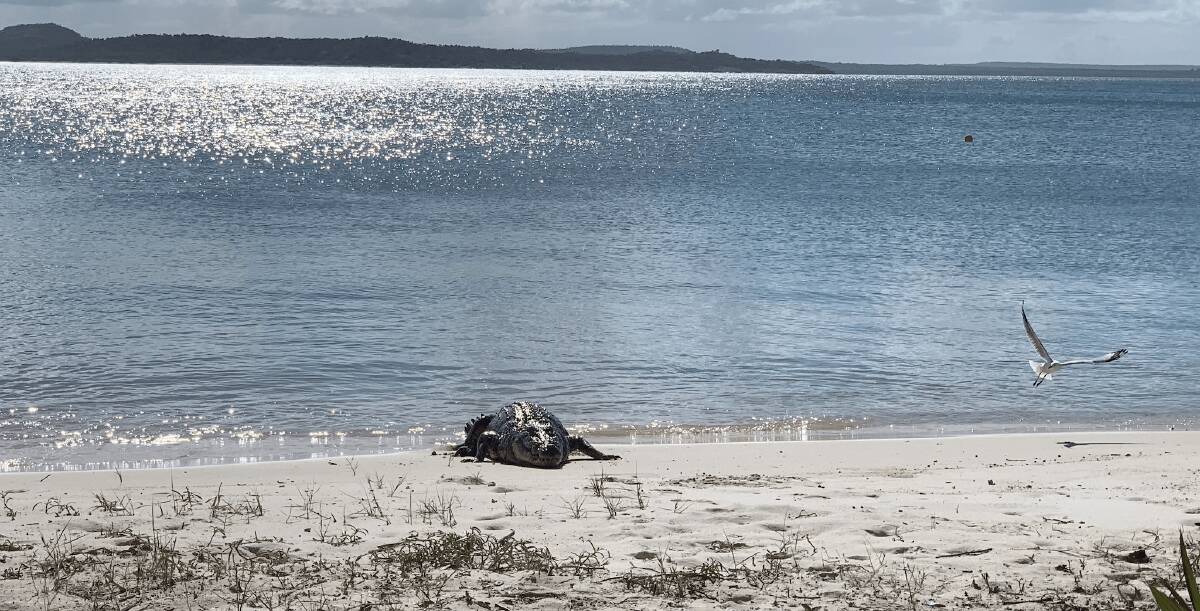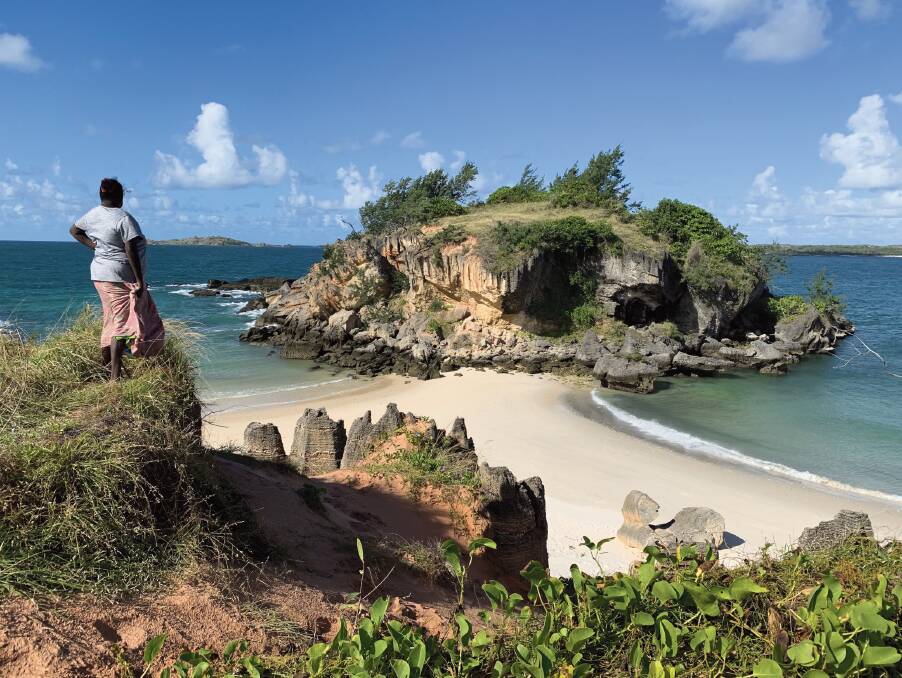Nike, the saltwater crocodile, has her gaze fixed firmly on us. She’s been lying in the same spot in the shallows all day, watching as we go about our business – a welcome smoking ceremony, weaving, dancing to the didgeridoo and clapsticks, collecting wood at dusk, sitting in front of the fire in the evening. I wonder what she’s thinking. Is she waiting for one of us to venture too close, so she can snap us up for supper? Is she viewing us as entertainment, like we sit on the lounge and watch TV?
Create a free account to read this article
$0/
(min cost $0)
or signup to continue reading
Or is she simply curious about what we are doing?
Nike has been a regular visitor to this East Arnhem Land beach where we are staying with the Yolngu people for more than a decade, possibly two. Rescued from a ghost net as a baby, the Indigenous community has been feeding her ever since. Believed to be a female because of her size and narrow face, she was originally called Cathy Freeman, but when the Olympian visited with actress Deborah Mailman during filming of the Lonely Planet documentary series Going Bush in 2006, she suggested they call her Nike instead.
Saltwater crocodiles aren’t a common choice for a pet, but Lirrwi Tourism founder Djawa (Timmy) Burarrwanga thought Nike would be a drawcard. Just as people want to see lions when they go on safari in Africa, they want to see crocodiles when they come to the Top End.
As well as providing employment for the Indigenous people, Timmy saw tourism as a way to educate people about Yolngu culture. “I wanted to see tourism right across Arnhem Land,” he says. “I wanted a new economy with a low environmental impact. Mining kills and destroys the land.”

I can understand his vision. Our four-day tour begins and ends in Nhulunbuy on the Gove Peninsula, which is also home to a Rio Tinto bauxite refinery. Miners in high-vis shirts sit alongside tourists on the plane to Gove Airport. From there, it is a two-hour drive to Bawaka, on the eastern shore of Port Bradshaw — the closest of four homelands that can be visited with Lirrwi Tourism. I am on the Gay’Wu (or dilly bag) women’s tour, which is a special experience just for female visitors, where the Yolngu sisterhood share their culture, history and country.
Upon arrival, we sit around a table under the shade of a tamarind tree, introduced into Australia by Makassans who travelled by boat from Sulawesi (modern-day Indonesia) to trade for sea cucumbers. After being introduced to Nike, we take part in the welcome smoking ceremony, which is designed to cleanse our spirit and let ancestors know that we are permitted to come onto country. Timmy taps two clapsticks together and sings in a language he tells us is 70,000 years old. The women rub ochre across our foreheads. It feels cool and refreshing in the tropical heat. Branches are placed in the fire, with the smoking leaves then patted over us.
Timmy warns us that a tour with Lirrwi isn’t for the faint-hearted. “This is not five stars, it’s a million stars,” he says. We sleep in shared accommodation in a custom-built shed, which also encompasses the outdoor camp kitchen, with vines growing through the louvre windows and geckos crawling on the wall. I’m surprised to discover there are two flush toilets, as well as two showers.
But late on the first day, Timmy’s cousin Noella Ganambarr says there is a “big problem”, shaking her head. Knocking on the tank, which stores bore water, she had discovered it was empty. So much for those flush toilets. A plumber is called in from Nhulunbuy to fix the broken pump the next day. After tinkering away for a while, he emerges with bad news — we will have to wait for a part to arrive from Darwin. “So yeah, just go for a swim to wash,” he laughs, motioning in Nike’s direction.
While that’s not an option, we do get to swim in the clear turquoise waters at nearby Lonely Beach, a strikingly beautiful spot where two stretches of white sand meet at a rocky island. In other parts of the world, it would be swarmed with tourists. But as outsiders are only able to visit as a guest of the Indigenous community, we have it all to ourselves. One of the women, Rowena Munungurr, stands on the cliff and scans for crocodiles before we walk down a steep red sand track that opens onto the beach.
I wouldn’t say I’m 100 per cent comfortable, though, and my dip is a quick one. Our time on the beach feels like a lesson in mindfulness. One woman comes across a crab eating an oyster; another discovers an unusual green seashell; another finds ring-shaped shells which she wears on her fingers. The Indigenous women chip oysters off rocks with a hammer and share them with us. While small, they are packed with flavour and I can’t help letting out a little groan as I savour their juicy, salty taste.
While we have an idea of the kind of activities that we will take part in, there is no set itinerary. In fact, we are advised to take our watches off.

One day, we had thought we were going to have free time before going searching for pandanus leaves which we will learn to weave in the late afternoon, when it’s cooler and “the snakes are less active”. We unanimously agree that sounds like a good idea. Instead, we receive a lesson from Timmy on the complex Yolngu kinship system, and are taught various traditional dances. They include movements inspired by sharks, cockatoos and, of course, crocodiles. With the pump still not fixed, we also do a rain dance, but besides a dark cloud looming on the first night, the sky remains clear. As we follow his directions, Timmy motions for us to go lower, laughing aloud at our uncoordinated moves. He jokes about taking photos and videos for Facebook. “I’m never going to forget this!” he guffaws.
While the Indigenous ladies are shy and softly spoken, Timmy is confident and cheeky, but also thoughtful and generous. He explains the Yolngu concept of Dhuwa and Yirritja, which are similar to ying and yang. Every person, the land, the water, every object in nature, is one or the other, so everything is in balance. When people marry, they must marry the opposite moiety. Children follow their father’s moiety. We also learn about skin names, which are passed down from the maternal side.
“They identify who you are no matter where you are,” says Timmy. “There’s no strangers in our culture or in our law.” By choosing an object we find, Timmy tells us which skin group we are, and how we are related to him, as either his daughter, sister, mother, aunty, cousin, or wife.
Timmy then asks us what generation Australian we are. We take turns going around in a circle and reveal our parents, grandparents or great-grandparents immigrated from countries including England, Ireland, Lebanon, Scotland, France, Germany, England, the Netherlands, Croatia, Lebanon and Samoa.
“We are 1000th generation Australian,” says Timmy. “This country needs healing. Here we have a bush library, a bush university.”
Our schedule is also largely determined by the tides. After our lesson, Timmy and his male relatives offer to take us fishing.
We spread out holding a gillnet in the water, feeling the fish hitting the net as they swim into it. We catch about 50 queenfish, which we untangle and place in cooler boxes before collecting firewood to build a fire on the beach, wrapping some of the fish in foil and cooking them up fresh. As the sun sinks on the horizon, we sit in a circle and eat the succulent white flakes off a bed of reeds.
The nightly ritual of building a fire
proves one of the highlights for us city slickers. On the last evening on country, as we are sitting watching the flames flickering and crabs scuttering along the sand at dusk, we spot a dolphin’s fin rising majestically out of the water, stealing Nike’s thunder, ever so fleetingly.
Take me there
Fly: Airnorth operates daily flights to Gove Airport from Cairns (1 hour 40 minutes) and Darwin Airport (70 minutes), both of which connect with flights from other capital cities.
Tours: The four-night Gay’Wu women’s tour and the similar Crossing Country tour starts from $2399 per adult, $1999 per child. Tours include accommodation, meals, ground transport and homeland access fees. There are also specialist tours focusing on art or photography.
When: April to October only.
Explore more: lirrwitourism.com.au




